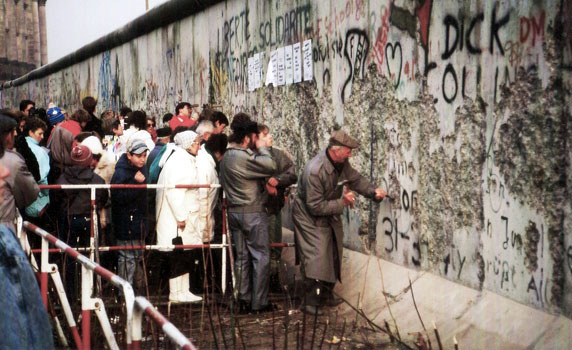
As the world prepares to celebrate the 25th anniversary of the fall of the Berlin Wall, former president of Poland and Nobel Laureate, Lech Walesa, reflects on lessons from the past and on what it means to lead. In this article for IESE Insight he sees a bright future for Europe if we focus on the positive, and learn how to become a force for change.
Sandwiched between two powerful and frequently warring nations – Russia and Germany – we in Poland learned to stay alert to future developments, spotting the opportunities, but also the threats, for our country. We never accepted the status quo. Stalin used to say that the Communist regime fit the Polish people like a horse saddle put on a pig, and we didn’t rest until we had thrown the saddle off. That fact of history made us who we are.
Today the world faces a new set of facts. The global financial crisis has shaken the resolve of our banks and businesses, our countries and communities, and raises questions about European integration.People are throwing up their hands in despair, saying there is no chance whatsoever of changing the status quo.
Frankly, I’ve heard that before. We had hundreds of thousands of Soviet troops in Poland, another million surrounding Poland, and nuclear weapons besides. People believed that nothing short of an all-out nuclear war would eradicate Communism. But look what happened.
How come everybody miscalculated the future so badly? Probably because they calculated the wrong things: the tanks, the missiles, the troops. We’re doing the same thing today, focusing on everything that is wrong, instead of what is right. Yet the failures need not discourage us. Remember the reforms of perestroika and glasnost? Implemented to shore up Communism, they ultimately sped up its demise. Success can arise even from ostensible failures.
What, then, should our message today be? Here are a few lessons I’ve learned from my years as an activist since the 1960s.
First, consider how far we have come. Yes, there is still division in the world, but we have succeeded in eliminating a major one: the divide between Communism and capitalism. I am amused whenever I see anti-globalization protestors using mobile phones – the very icon of globalization. Our gadgets and information can no longer be confined to one small country. People will use whatever they find functional. That’s why, even if we dismantled capitalism, globalization and the European Union today, by tomorrow we would start to rebuild them. We know what it’s like to enjoy prosperity, peace and wellbeing, and no one is seriously prepared to relinquish that.
This is not to say that the capitalist system in place today is perfect. While I don’t see anyone seriously suggesting we do away with private ownership and free market principles, I do wonder whether our current structures are adequate for the world of tomorrow. We should have this debate – calmly – concerning which corrections would make the whole system more sustainable.
These corrections must include a discussion about values. In my experience, values proved stronger than tanks, missiles or money. I would propose that we try to reach a consensus on a set of values that could govern our lives, institutions and workplaces. We need to encourage individuals of conscience. This applies as much to democracy as to our economic system. People don’t protest against democracy per se, but rather against politicians who lie, cheat and steal.
The good news is that our technology is advanced enough to make improvements. What if every politician were implanted with a chip that recorded his or her every movement? I may jest, but the means exist to make politics and our lives more transparent, for the better.
However you choose to become an agent for change, whether from inside or outside the system, you have to be prepared to change yourself along the way. Over the years, I had to become a bit less popular. For example, I knew that getting rid of the Soviet Union would hurt our shipyards – but it was a price worth paying. Sometimes making the right decision will cost you dear.
This is why you need to keep a larger perspective. It used to be that you could afford to think only in terms of your own interests and not care about your neighbors, as the crises only affected your own country. The global financial crisis put an end to that attitude – and just as well. Now, we realize that our neighbor’s wellbeing is intrinsically bound up with our own.
So rather than bemoan the state of the world today, I urge you to enlarge your vision. Commit yourself to engage. And never let anyone tell you it’s impossible.
Lech Walesa, Nobel Laureate and former President of Poland, spoke at the Fast Forward program held at IESE in June 2014.
This article was published in the latest issue of the IESE Insight magazine